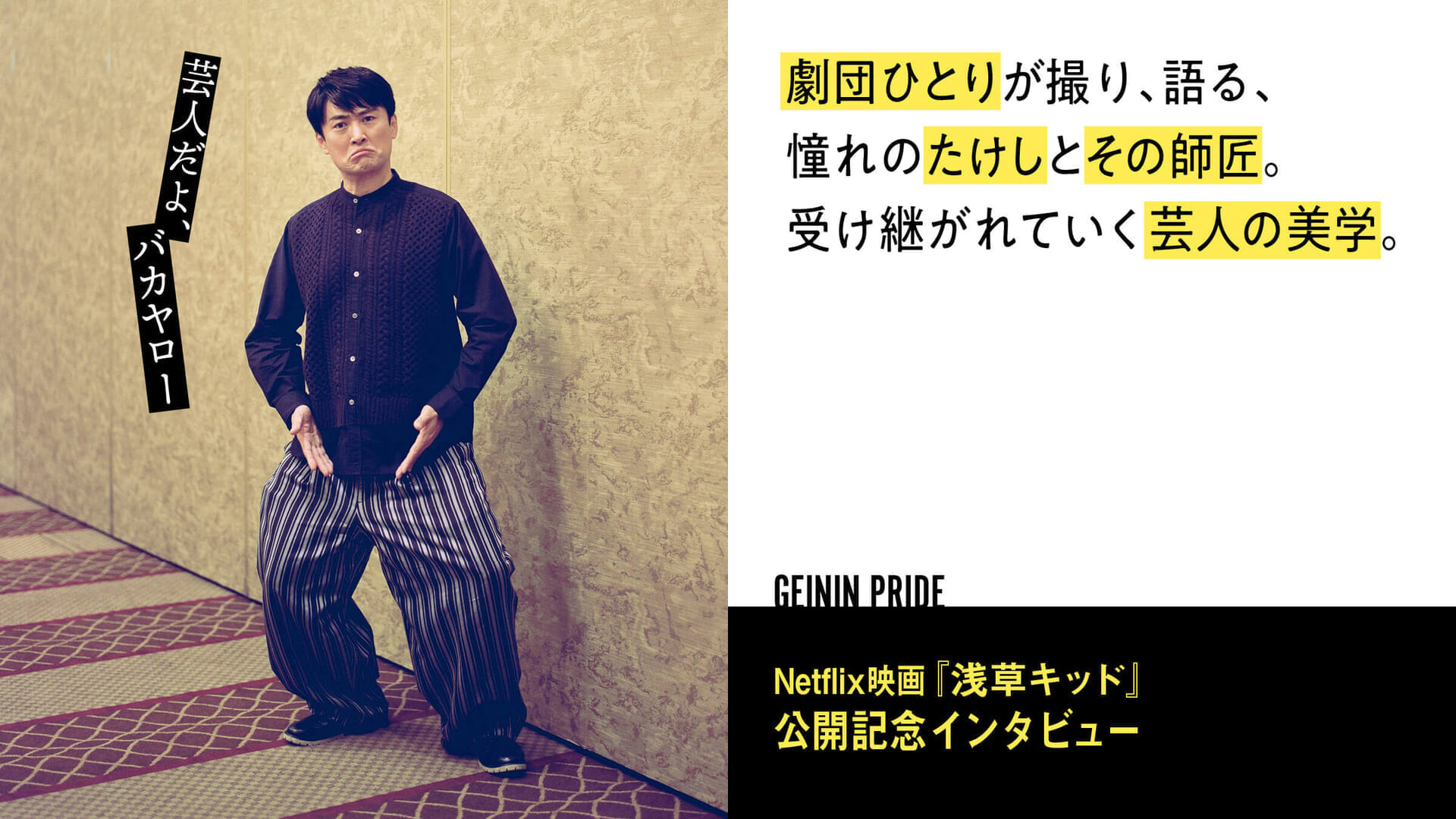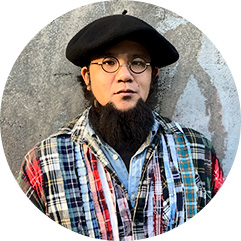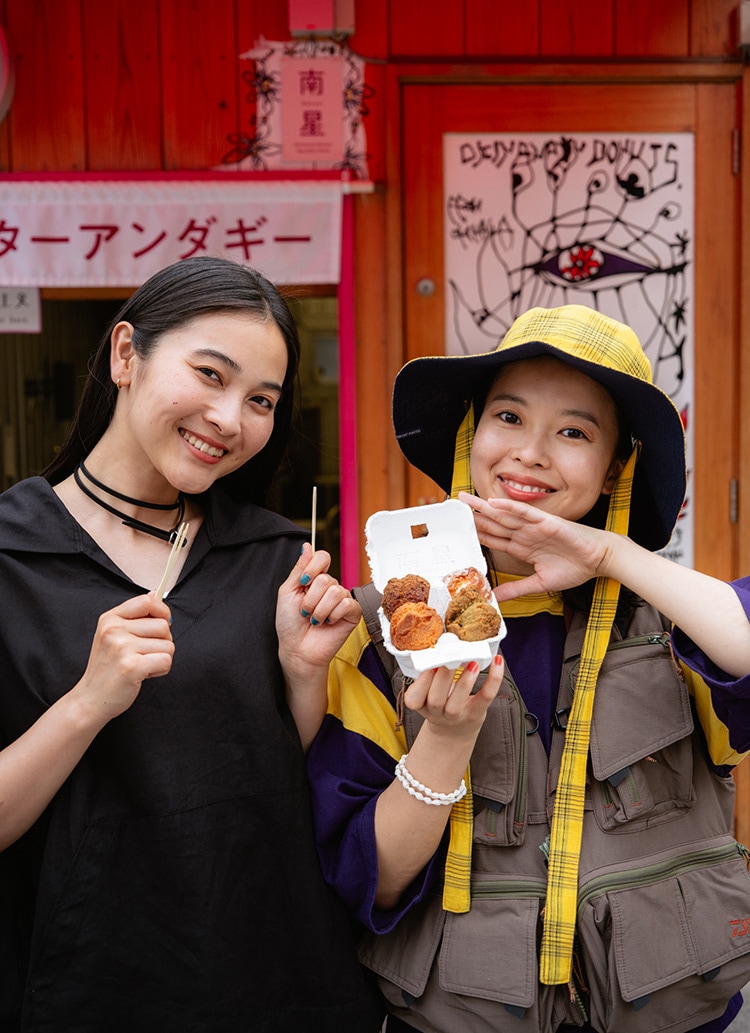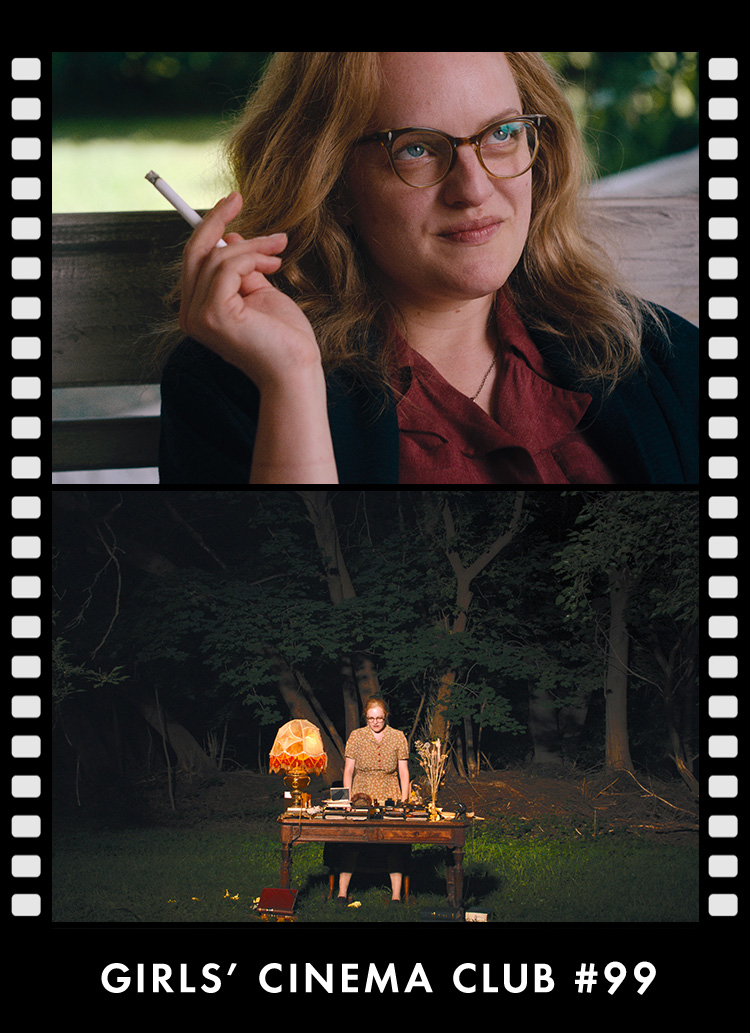Asakusa, Tokyo in the 1960s. Takeshi (Yuya Yagira) drops out of college and moves into the "comedy hall of fame," the Franceza, where he volunteers to be an apprentice to Chisaburo Fukami (Hiroshi Oizumi), who is known as a "phantom Asakusa performer. Under Fukami's blunt but unique world and under the watchful eye of Chiharu (Kadowaki Mugi), a dancer who aspires to become a singer, and Fukami's wife Mari (Suzuki Honami), Takeshi gradually learns the essence of the art and grows as a performer. However, with the spread of television, the number of customers at the Franceza declined, and the business deteriorated. Takeshi was eventually invited by Kiyoshi (Naitsu Nobuyuki Tsuchiya), a former senior member of the Franceza, to form the manzai duo Two Beat. Over the vehement opposition of his mentor, Takeshi leaves the French troupe and rises to stardom.
PROFILE
Born in 1977, he made his debut in 1993 and has been active as a pin comedian "Gekidan Hitori" since 2000. He has gained popularity for his comedy with characters created from his unique view of the world. He is also active as an MC on TV variety shows, and has written novels and essays such as "In the Shadow of the Sun" and "Bolt from the Blue Sky. In the Sunshine of the Spotless Mind" became a bestseller, selling over 1 million copies. He also directed and wrote the screenplay for the movie "Bolt from the Blue Sky" and directed the drama "Beshari Kurashi", demonstrating his multifaceted talents not only as a comedian but also in many other fields.
How can we portray God and his master's life and the world of comedians in a fascinating way?

Please tell us how you came to direct "Asakusa Kid" this time.
Gekidan Hitori:I picked up the original novel when I was a teenager. At the time, I was fascinated by the muddy world of geisha, where people dream of making a living in the arts, and the teacher-student relationship depicted in the story. I myself have written two novels, both set in Asakusa's strip theaters and entertainment halls. The Asakusa Kid" has always been at the root of both of them. After I was allowed to shoot my last film, "Bolt from the Blue Sky," I thought about various ideas for my next film, but I couldn't lie about my feelings because I really wanted to shoot "Asakusa Kid. I decided to give it a try and started writing the script. I took it to various places to have it read, and after repeated attempts to have it made into a movie and then disappearing, it finally came to fruition.
How long did it take, exactly?
Gekidan Hitori:It's been seven years, so it took a long time, really. It took a long time, really, because they wouldn't let me shoot it (laughs). To be honest, Netflix was my last hope, and if it didn't work out, I felt like I would have run out of steam.

I would like to know what you were conscious of in adapting such an original story with such strong emotional attachment.
Gekidan Hitori:The most important thing is how to convey the fascinating world of comedians, including the bond between Master Fukami and Takeshi, their way of life, and the human drama of the people surrounding them. Takeshi is like a god to me, and there are many fellow comedians and fans who think so. Since Takeshi-san is my only teacher, I must never tarnish his reputation. I tried to convey the charm of this work to as many people as possible. For example, no matter what kind of acting plan the actors had and what kind of attitude they had, it would be meaningless if the audience did not get the message, so I persisted and reshot the film many times until I got the expressions I wanted. I was also careful not to convey too much information to the audience.
I see. I heard that Takeshi-san gave you permission to make the film.
Gekidan Hitori:I want to make it into a movie!" and without a pause, he said, "Okay. I thought to myself, "Why don't you hesitate a little longer? (laugh). When we met again some time later, I said, "I'm preparing for Asakusa Kid right now! He said, "What, are you making a movie out of that? I had completely forgotten about it (laughs). I had completely forgotten about it (laughs).

(laughs). I also heard that you interviewed Takeshi-san himself when writing the script. What did you ask him about?
Gekidan Hitori:I think it was Master Fukami's personality. There are almost no visual materials left, and although many episodes have been handed down to us, we have not been able to grasp his personality, so he taught us about him in detail. Takeshi-san told me that Master Fukami was a shy person, and that he would get angry when he was happy and make fun of himself when he was sad. He is embarrassed to let people see his inner self." These words helped me a lot in writing the script and in directing.
Have you seen the completed work, Takeshi-san?
Gekidan Hitori:It's not yet, is it? I am looking forward to hearing what he thinks about it, but I wonder how he will feel when he sees his own original story and song being used in the film, and Yuya Yagira playing the role of his younger self. I can't imagine how he would feel about seeing his own work and songs used in the film, as well as Yuya Yagira playing himself when he was younger.

I was surprised to see Yuya Yagira play Takeshi.
Gekidan Hitori:I was so worried and deliberated about it carefully that I applied it to all the actors in Japan at least once. The final deciding factor was his appearance. Mr. Yagira himself has the same atmosphere as Takeshi. He is a very lonely person, or perhaps because he is a genius, he is unable to understand anyone, and sometimes you can see glimpses of his horrifying fearfulness. I am very happy that I asked him to play Takeshi.
Yagira-san's Takeshi was surprisingly Takeshi-san.
Gekidan Hitori:We wanted to mimic Takeshi as much as possible, so we practiced his impersonations for hours every day. We practiced various patterns, such as a slightly scary Takeshi, a cheerful Takeshi, and so on, while watching past videos. Gradually, as the quality of my mimicry improved, I thought, "It's not the mimicry I want to see. So, before crank-in, I suggested to him, "Let's let go of the idea of mimicry and become Takeshi-san in the spirit of the film. As a result, the actor was able to strike an exquisite balance between the two.

The other main character is Chisaburo Fukami, played by Hiroshi Oizumi.
Gekidan Hitori:Master Fukami must have been very worried. For those who have read the original work or know the actual master, the casting of Mr. Oizumi may seem confusing for a moment. I heard that he was actually a very strong-looking person, and I was thinking in that direction at first, but it just didn't feel right. In fact, I thought it was too much of a good fit. At that time, I was rewatching my film "Bolt from the Blue Sky," and I thought, "I would like to see Mr. Oizumi's Chisaburo Fukami. I couldn't imagine whether or not he would be into it, but I thought that since I wanted to see him, everyone else must want to see him, too, so I asked him to do it. I have been picturing my own Master Fukami in my mind for years, so it is quite beautiful, probably. But it was even better than that, Mr. Oizumi's Chisaburo Fukami. He was clumsy, kind, sexy, and a really nice person with his own aesthetic.

Kiyoji, played by Nobuyuki Tsuchiya, also had a great flavor.
Gekidan Hitori:In any case, in order to portray Two Beat, we absolutely had to have a comic scene, and the atmosphere of a comedian was indispensable to make it work. However, this was difficult to do, and we couldn't go beyond the atmosphere of the material being performed by the actors in the play. I asked Tsuchiya, who is a comic storyteller, smells of Asakusa, and has an atmosphere somewhat similar to Kiyoshi. At first we couldn't schedule the comic scenes, so the assistant director played the role of Kiyoshi on our behalf for a long time, and we practiced with Mr. Yagira, but it didn't go well.... Then the schedule was finally cleared and Mr. Tsuchiya appeared on stage. When we tried our comic dialogue, the tempo was completely different from the first shot. Mr. Yagira was pulled along with him, and at once it became more like a two-beat. I realized how professional he was. I was thinking that even if the acting was not very good, it could not be helped, but it was very natural. I was worried because his partner Hanawa is a terrible daikon (Japanese radish), but he was wonderful (laughs).
The word "bakayaro" appears frequently in the play.
Gekidan Hitori:Anyway, Master Fukami is a person who says "Bakayaro, Konoyaro" as well as punctuation, especially to those close to him. I guess the point is that he is open-minded. So I told Mr. Oizumi, "Please be aware of "bakayaro" with affection, not with bad words.
I especially liked the "I'm a comedian, asshole" that appeared twice.
Gekidan Hitori:We were trying out different patterns, and I think we had each person do at least 30 takes. Although it is a definitive line, I am sure he did not think so, so I did not want him to say it like a definitive line. Master Fukami started out by saying it in a cool way, but in the end, I think he was allowed to say it as if it were a matter of course. Takeshi tried a serious pattern, and even imitated Fukami's way of saying it, but I thought he might say it with a laugh, as if to hide his embarrassment, so I asked him to do it with a laugh, and he immediately said yes.

What is your personal favorite scene?
Gekidan Hitori:Takeshi sold out and asked for a master for a long time, but I've always liked those two guys there. Even though I wrote the script and shot the film myself, I admired them. I especially admired the way they were walking side by side, talking about how they were "so funny. I think it's wonderful that no matter what the situation, they are always concerned about what is absolutely important to them, whether or not they are "popular".
You are very much like a comedian, aren't you? You mentioned earlier the "muddy world of comedians." Did you feel differently when you were working as an underachiever?
Gekidan Hitori:First of all, there is no master. When I was a teenager, I read a book called "Asakusa Kid" and thought that the way to become a geisha was to perform at a strip joint or an entertainment hall, but in reality, it was basically at a live music club. In reality, however, it was basically live music clubs in Shinjuku, Shibuya, and Ikebukuro, and there was not a single job in Asakusa. Even the music was not shamisen, but Aerosmith or something like that (laughs). (Laughs.) I was puzzled by the fact that it was different from the days when I was working as an underachiever. The customers were not elderly people, but high school girls, which was quite shocking at the time. On the other hand, I had debts and was not selling well, so I would go out drinking, hit on girls, get dumped, drink, lie on the side of the road, and take the first train home. There was a time when I was drunk with my sloppiness (laughs). (Laughs.) "I felt like a comedian," I thought.


Do you have a policy or an image of yourself that you aim for?
Gekidan Hitori:I am the type of person who thinks that I have to live wisely by listening to what the world has to say, even if it is different from my own opinion. I think that is why I admire people who live the opposite way. I also really like Tora-san from "Otoko wa Tsuraiyo" (Otoko wa Tsuraiyo), but I guess I'm just begging for something I don't have. Master Fukami is the same way. Whenever he goes out for a drink without money, he always gives 10,000 yen to all the waiters there. He doesn't like it when people thank him for the money, so he makes sure to have Takeshi give it to him. He does not want to be thanked for giving it to him directly, so he always makes Takeshi give it to him. I hope I will never forget that feeling.
- 1
- 2












